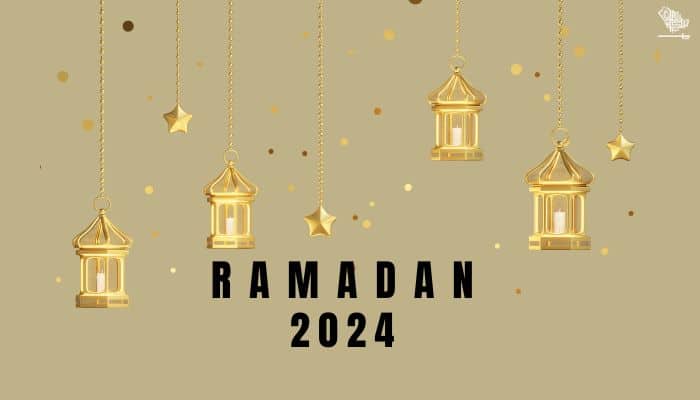It looks like it’s that time of year again! With Ramadan just around the corner, Muslims worldwide are gearing up for this all-important holy month. Before we start making preparations, it’s essential to address the question: When will Ramadan start?
As the ninth month in the Islamic lunar calendar, Ramadan starts right after Sha’ban. It marks the beginning of the mandatory fasting month for Muslims. From the start to the end of Ramadan, most practising Muslims will fast from dawn till dusk. The first night of Ramadan also heralds the beginning of the nightly Taraweeh prayers.
This year, the predicted Ramadan start date in Saudi Arabia is Sunday, March 10th, 2024. Since it will commence in the evening, Muslims will start fasting the following morning, on March 11th.
When will Ramadan 2024 start
Here are the expected starting dates for Ramadan in some major areas around the globe:
- Saudi Arabia: March 11 or 12, 2024
- UAE: March 11 or 12, 2024
- Pakistan: March 10 or 11, 2024
- India: March 10 or 11, 2024
- Bangladesh: March 10 or 11, 2024
- Canada: March 10 or 11, 2024
- USA: March 10 or 11, 2024
- Europe: March 10 or 11, 2024
What is Ramadan
Ramadan is a holy month of fasting, worship, prayer, charity, and reflection. During this month, Muslims abstain from most worldly pleasures such as food, drink, smoking, intercourse, and so on.
This month is also important for giving charity. Muslims believe that all good deeds during Ramadan earn them several times more reward than any other time. With this in mind, they spend more on charity, increase their Quranic recitations, and enhance their spiritual discipline.
What do Muslims do During Ramadan
During Ramadan, Muslims wake up before the break of dawn. They then consume a pre-dawn meal called Suhoor and prepare to offer the Fajr prayer. Once the time for Fajr starts, the fast period begins.
After that, the fasting person may rest, study, shower, go to work, or do whatever they like while remaining within the limits of the fast. It is also recommended that a Muslim take even more care to avoid backbiting, anger, slander, and other negative activities.
At sunset, with the call of the Maghrib prayer, fasting Muslims break their fast. This meal is called Iftaar. Dates and water are the preferred Sunnah way to break a fast.
After the iftar meal, Muslims congregate at the mosque for Taraweeh prayers.
They might also choose to offer these prayers at home. The last ten days of Ramadan are considered especially beneficial for spiritual progress. Some Muslims observe Iti’kaaf, staying solely in the masjid or a secluded corner of their home for worship only.
Traditional Ramadan Foods
Many traditional foods are eaten during Ramadan. Traditions may vary according to the background and culture of each family. However, the following foods are usually enjoyed in Saudi Arabia at this time:
- Dates
- Water
- Arabian coffee
- Soup: lentils, harees, chicken, etc
- Samboosa or samosa
- Sambousek
- Kebabs
- Foul medames
- Kabsa
- Mandi
- Qamar-al-din
- Luqaimat
- Jareesh
- Hareesah (dessert)
The Best Ramadan Gifts
Ramadan might be a fairly quiet month, but it still comes with some celebrations and gifts. Children are celebrated when they keep their first fast or manage to fast for the whole month.
Some people also celebrate the completion of the Quran during Taraweeh prayers. Others may want to celebrate the spiritual joys of Ramadan and the happiness of families getting together. A few examples of gifts given on such occasions may include:
- Dates
- Chocolates
- Cookies
- Zamzam (holy water)
- Prayer bead or tasbihs
- Copies of the Quran
- Books of Islamic teachings
- Prayer caps
- Hijabs and abayas for women
Conclusion: Welcoming the Holy Month of Fasting
Ramadan is a sacred month in Islam, with many traditions that might vary across cultures. It’s a time for families to get together, eat different dishes, pray, worship, and give in charity. Overall, it’s one of the most spiritual and memorable times of the year for Muslims.
DISCLAIMER: The images/videos/logos showcased on this page are the property of their respective owners. We provide credit and sources wherever possible. However, If you find that your image/video is displayed on this blog without authorization, please contact us with the relevant details, and we will promptly address your concerns.

Rosa Gardens is a writer at Saudi Scoop, dedicated to delivering insightful and engaging content. With a keen eye for detail and a passion for storytelling, Rosa covers various topics that inform and inspire readers.




